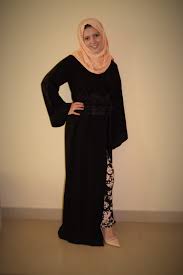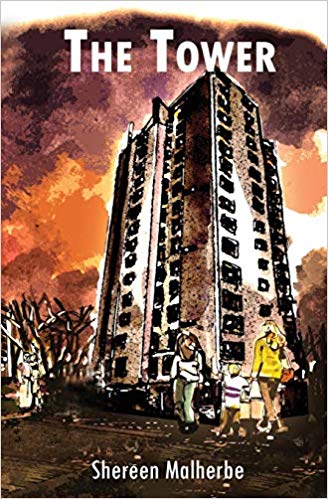|
by Rana Asfour This month saw Shereen Malherbe's much anticipated second novel published by Beacon Books hit the shelves. 'The Tower' is the story of two women who become friends after bonding over their altered circumstances. Neighbours in a communal building in London, Reem, a recently arrived refugee from Syria, and Leah, a British single mother from Kensington forge a friendship as they learn to navigate a life foreign from anything they knew before. Despite the tragedy at the core of this book, it is a novel about hope and resilience in which Malherbe explores life in a tower block and what it's like to share a public space in daily proximity with residents who come from different religious, socio-economic or ethnic backgrounds and how that affects the general well being and social structure of the tower dwellers not only when times are good but when they are far from good as well. You can read my full review HERE. BookFabulous: Your book is inspired loosely on the Grenfell Fire that took place in the UK in 2007. Can you tell us a little more on why you chose that event on which to build your novel?
Shereen Malherbe: The Grenfell Fire was such a devastating event and one that affected the whole community. It brought to light many underlying issues from the socioeconomic divide to the amazing resilience, diversity and support of the community there. I read many heartbreaking stories about those who were lost. This idea of a multiple living accommodation was in my notes for a while, but after Grenfell I had a new urgency to write about a setting like this. BF: There are so many characters in this novel but the one that stood out was obviously Reem, the Syrian refugee who although seems to speak very little English and feels completely alien to the society she’s in, is however not lacking agency and is surprisingly strong and capable despite what she has been through and the secret she carries. How difficult was her character to write and what did you wish to accomplish through her story? SM: I wanted to bring a different perspective of someone who is fairly privileged and sheltered and, as with many escaping the atrocities of war, they have no choice but to try and live somewhere far from home. I don’t think this is often a considered perspective. When researching, I realised that what crossed borders was people’s faith. They drew strength from it and this helped Reem to find an anchor despite everything falling around her. This also helped me understand how someone could cope with the devastating events in their life and gave me an optimism to propel the story forward. BF: This brings me to Leah who arrives to ‘The Tower’ from a pampered place where everything had been done for her and now she is alone and a single mother too. I couldn’t figure if Leah was naïve or just privileged and whether she could have done more to help Reem instead of coming across as slightly self-absorbed. What do you think? SM: For Leah, she didn’t have the same kind of grounding as Reem; her values were based on transient things like materialism or status, so that comes across in her privilege. I think it represents privilege in some ways in that it creates a barrier that can be hard for people to see past it, into other people’s problems and lives. BF: Although ‘The Tower’ is not a love story per se, is it safe to say that it is a story about love despite the personal tragedies (some more harrowing than others) that take place or is it because of what the characters experience both on a personal level and collectively that love and empathy became so important? SM: I would say it is a love story but that often love centres around two people falling in love and I wanted to explore it in another way. As you point out, collectively love and empathy become important because that is what provides us with comfort and forms the foundation to our most important relationships. Without it, the world would be an even darker place and for this book, I feel that it is that shared humanity that provides some much needed hope. BF: When I reviewed your first novel ‘Jasmine Falling’ I felt that Islam had a mystical presence in the narrative which is far from the case in ‘The Tower’ where Islam seems to be more a religion of conduct and leading by example as Mo and Nidal demonstrate time and time again which I felt made Islam more relatable to everyday life. Was it a conscious decision on your part to do so? SM: I don’t think it was a conscious decision as such, but more as personal growth from the first novel and how I have experienced people gain strength and direction from Islam. Also, Islam is so widely misunderstood that it was a conscious decision to show the effects of what it looks like in everyday life. The scene where the Muslims returning from prayer and were the first on the scene was taken directly from research of the Grenfell fire and I think representation should be authentic and balanced because positive contributions to society should be seen. BF: How much research did you have to put in to write this novel and are any of the characters based on real people? SM: I researched the event for months before I began the writing. I also researched refugee experiences and most of the plot points were taken from actual events. But as for the characters, they are not based on real people. The beauty of fiction is that it enables you to take readers on a journey through them. BF: Although it felt that much of your novel was a case of documenting hot current political and social news stories both globally and in the UK, it also felt like you were deliberately turning the tables to allow for the stories to be viewed from a different perspective. If so, could you elaborate on that a bit more. SM: Yes, the differing perspectives is what I wanted to create. I think reading should be an experience so I wouldn’t want to impart my views on readers. Instead I use multiple perspective stories to show different trajectories to allow the reader to come to their own unique conclusion. BF: I'd like to discuss the sense of community in ‘the Tower’ where everyone seemed to pull together regardless of their background and it felt that ‘The Tower’ was in a sense a place of refuge for all of them. But it was also a space that was not immune to stereotyping with the perpetrator not necessarily white or British. Would you tell us more about that. SM: As you have eloquently said in your review, stereotypes and labelling mean people are not given agency as individuals. I wanted to turn these upside down as they are too reductive, often incorrect and boring to read. Societies are turning into melting pots and the global influence of these communities that do exist in London and all around the world mean that we are exposed to each other’s differences. I wanted to celebrate diversity and show how we can use each other’s differences for the better good. Seeking to understand people as humans must be the basis for more understanding and in climates where fear is induced by exacerbating differences, another narrative is needed. As in the novel, events have mirrored real life and this isn’t a coincidence. When you spread hate and fear it leads to real, devastating consequences and it’s important we recognise and try and change that. BF: Without giving away spoilers, we know there is a big tragedy that happens. But when it does happen we’ve already come to care about most of the cast and then some don’t make it. They die. How hard was the choice to decide which characters you were going to dispense with and did you know beforehand who was going to stay alive until the end? SM: This was a tough one. Believe it or not I am an idealist and I hated to do it. But I wanted to go to the darkest parts of us and almost discover how you would survive and what would keep the characters going. My husband hasn’t forgiven me yet, and I am sure there will be more readers who don’t, but death is an inevitable part of life. What I was most interested in, is seeing how you can scrape good from tragedy. BF: Final thoughts? SM: I just want to thank you for your time on this, and to extend a thank you to my readers who give the book their time. The most important part of writing is having an audience to share it with.
2 Comments
4/9/2020 12:33:15 am
Extremely decent blog! I would like to thank you guys for sharing such a fantastic blog. Regards <a href="http://accleaningdubai.com/wall-painting-company-in-dubai/">Wall painting company in dubai</a>
Reply
Leave a Reply. |



 RSS Feed
RSS Feed
